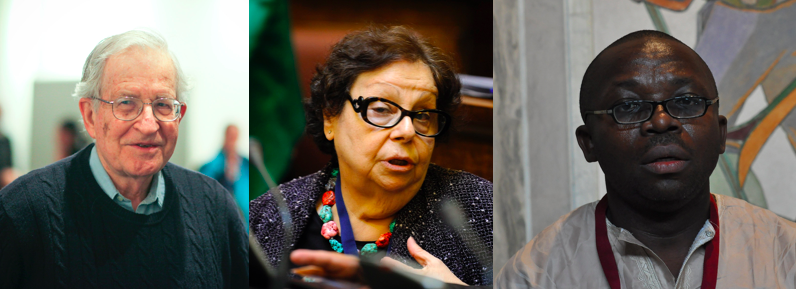A major leftist author of countless books interviewing leftist giants like Noam Chomsky once told me over tea that there is no American left. It is a common refrain on the left but a curious statement from one of its leading lights.
The American left shares a similar distaste for corporate media, imperial wars, money in politics, overconsumption, fossil fuels, racism, sexism, and homophobia. It gets its news from Democracy Now, learns history from Howard Zinn, climate change from Bill McKibben and it supports Bernie Sanders for President.
It has the power to sway elections and build transformational social movements. And from Civil Rights to the War on Terror, Medicare for All to the Green New Deal, it pioneers the causes that define generations. But it can often seem to outsiders as if its thinkers and leaders represent more a series of shifting fetishes than a set of enduring principles.
For the picture of who makes up the left and what they want gets fuzzier when we look to the things they share in common with leftists in other parts of the world. And it is here where Andy Heintz has set forth a remarkable challenge in assimilating seventy-seven of the world’s leading leftist thinkers and activists in Dissidents of the International Left.
The biggest western names, like Noam Chomsky, Kwame Anthony Appiah, Michael Walzer, George Monbiot, and Michael Lerner, will probably pull in the biggest audience. It is a deep and diverse group of thinkers, reaching far outside the box of the kind of leftist orthodoxy mentioned above.
But lesser known thinkers from the developing world may be even more interesting, for they are often women, struggling against authoritarianism, and working to protect human rights. And there is an immediacy and vitality to their concerns that is often missing among leading western leftists.
Thinkers like Syrian intellectual and ethicist Yassin Al-Haj Saleh, the Ugandan anti-colonialist Mahmood Mamdani, and the Indian Nobel laureate in economics Amartya Sen will stand out. But others like Indian filmmaker Gita Sahgal, Afghani human rights activist Malalai Joya, and scholar of Islam Sarah Eltantawi might teach you something new.
Leftists in poorer states tend to struggle against authoritarian leaders and religious movements alike, and they are less likely to take their freedom of speech and ability to publish for granted. Their work for women’s rights is more likely to be tied to their struggle for survival, and their work for democracy is more likely to be part of the struggle for life itself.
Most everywhere the left believes in distributing political power through democratic institutions while using the state to improve the human condition. It supports women and children’s rights, minority and human rights; and it is sensitive to the plight of the poor, while almost compulsively protective of the downtrodden. All of this shows up in this dizzying array of interviews with leftist thinkers from every major region of the world.
The causes they take up are dictated by a shared sense of justice for the marginalized and the embrace of an ever wider and more inclusive moral sphere. But as some concern themselves with the rights of future generations, and others with the rights of species and ecosystems, and still others with the rights of refugees and the poor, a vast range of trade-offs open up countless sites of contestation.
The left disagrees over the aims that should be given priority, the means of achieving them, the compromises that should be made, and the structures that need to be built. This collection of voices focuses on disagreements around humanitarian intervention in Bosnia and Syria, and whether American leftists should concern themselves more with the actions of their own states than the genocidal regimes they condemn. But it might just as well have focused on disagreements over the trade-offs involved in protecting future unborn generations versus those who are alive today, supporting democratization abroad or respecting the integrity of developing societies.
Perhaps it was for this reason that when David Barsamian, the renowned leftist appearing at the beginning of this review, told me there was no left. My response was that there is, it just lacks an ideology. The idea was that the left needs a coherent set of aims, organized around recognizable values, that might spur it to action. But he seemed to hear in my suggestion a sort of straightjacket that might kill off the kind of diversity that makes the left stronger.
And herein lies the rub, brilliantly drawn together in this collection of interviews: if the left is to be globally effective, it needs to articulate a common set of values and aims, but it needs to do so from the ground up, responding to the real needs of people in crisis the world over. And instead of hitting us over the head with his abstract ideas of what this might look like, the author illustrates the overlapping concerns with an endless series of interviews.
What emerges is a sense of how decent people the world over respond to poverty and oppression, marginalization and environmental degradation. And while it may look different in Pakistan than it does in Poland, what ultimately emerges from this cacophonous assembly of dissenting voices is the faint outlines of a common humanity.
The left may not hold a monopoly on goodness, and it may sometimes advocate silence in the face of crimes so great as genocide; but these interviews remind us that it is at the forefront of the battle for justice across the world, and everywhere, its leading lights are pressing us to be better. And in a world of growing rightwing nationalism and fascism, we would do well to remind ourselves of how critical these voices are and just how threatened they might soon become.
